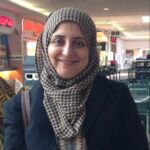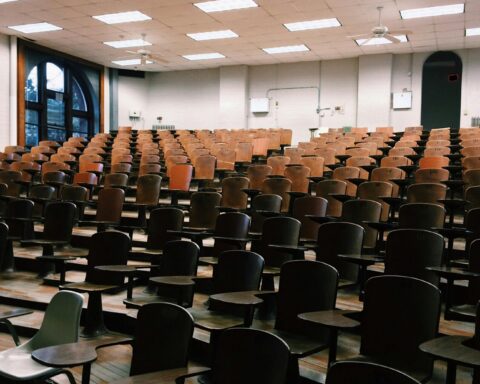Forty-two-year-old Hoda Yasir is considered one of the most trusted and punctual house-cleaning ladies in the west part of Mississauga. Still, the Syrian-born refugee doesn’t get much work because she has no personal transportation to commute to jobs, needing to be picked up and dropped off often. This adds to her woes managing a family of four kids and a husband.
Hoda, whose named has been changed to protect her identity, is a biologist by profession but, unlike most refugees, has no proof of her qualifications.
“They got burned,” Hoda shares. “They were in a wooden box, and later I couldn’t find it in the ashes of my bombarded house.”
Resettlement isn’t easy
During the ongoing civil war in Syria, Hoda and her family managed to leave the western town of Qusair near the Lebanese border and enter Lebanon. In early 2013, this town became the latest site of urban warfare when clashes erupted between regime and rebels.
She and her family stayed there for more than a year and, later in 2014 under the first privately sponsored refugee program, managed to reach Canada.
“Many Syrians who have come to Canada, both as refugees and immigrants, have become entrepreneurs.” – Alexandra Kotyk, Lifeline Syria
“My brother and uncle, with the help of Syrian community, deposited $75,000 for our immigration,” recalls Hoda.
“We came with nothing except for our passports, the only document, along with misery, wounds and agony of the home town. I didn’t know where to re-start, so I gathered all the courage and started a cleaning job, which does not need any expertise, documents or accreditation.”
It’s been two years in Canada for Hoda and her family. Her kids are going to school and are well versed in English now, but for Hoda and her husband – a computer specialist – the language barrier was another challenge.
“Once a lady called and misunderstood per-hour charges [between] one-five [and] five-zero,” explains Hoda. “It was a big house and unfortunately I ended up with a meager amount.”
Although Hoda and her husband are experienced in their respective professions, resettlement hasn’t been easy.
“I understand that nobody finds a job without getting Canadian accreditation or some certification and for that too, I need to have proof of my degrees and experience from back home,” Hoda says, pausing before she adds, “I’ll probably re-start from kindergarten.”
A 2007 study from the European Commission and the Organization for Economic Co-operation and Development shows that migrants have contributed to government revenues through entrepreneurship.
From refugees to entrepreneurs
Resettling Syrian refugees in countries like Canada can prove to have positive economic impact, as they arrive with some education, says Alexandra Kotyk, project manager of Lifeline Syria, a citizen-led initiative working to bring 1,000 Syrians to the Greater Toronto Area through Ryerson University.
“Many Syrians who have come to Canada, both as refugees and immigrants, have become entrepreneurs and have arrived with post-secondary education,” she says. “While the reason for resettling a refugee should be based on humanitarian principles and not economic [principles], we do expect that most will integrate quickly and contribute to the economy.”
The economic contribution Kotyk is referring to has proven true in some of the countries neighbouring Syria, where a 2007 study from the European Commission and the Organization for Economic Co-operation and Development shows that migrants have contributed to government revenues through entrepreneurship.
According to a 2014 media report, the urban refugees started more than a thousand businesses in Turkey, including new bakeries, food businesses, travel agencies and restaurants run by Syrians.
Hoda’s husband has entrepreneurial goals in Canada himself. “I plan to set up a computer repair shop soon, and my sons can play a great help and support as they are learning new things here in schools and colleges,” he shares.
A need to boost efforts
Despite the Canadian government’s claims that it takes in roughly one out of 10 refugees every year from the estimated 16.7 million refugees in the world today, it still faces criticism on various grounds.
Although the citizen-sponsored initiatives to welcome and support refugee families during their first year started off in the Greater Toronto Area, other major cities – Ottawa, Vancouver, Edmonton and Calgary — are encouraged to step up and organize sponsorship initiatives.
Firstly, the Canadian authority’s process has been said to be time consuming and it is not working out as the originally proposed 60/40 split between private and government sponsors.
Secondly, the Canadian government is urged to contribute to an $8.4-billion international aid appeal for Syria this year by the United Nations, which is twice the combined effort of previous two years. A report by Oxfam suggests Canada’s contribution should be $178.4 million for 2015, after contributing about $50 million in the first quarter of this year, as it failed to fulfill expectations of the UN’s humanitarian aid response in May 2015 in Kuwait.
In March 2015, Canada managed to meet its 2013 commitment of settling 1,300 refugees from Syria and pledged to resettle 10,000 more in another three years. However, where would this be done and who is responsible for bringing and settling the refugees to Canada are unclear.
And recently, in a campaign visit to Markham, Prime Minister Harper promised that, if elected, a Conservative government would accept 10,000 refugees from Iraq and Syria over the next four years, and pledged to spend $9 million in three years to support persecuted religious minorities in the Middle East.
Although the citizen-sponsored initiatives to welcome and support refugee families during their first year started off in the Greater Toronto Area, other major cities – Ottawa, Vancouver, Edmonton and Calgary — are encouraged to step up and organize sponsorship initiatives like Lifeline Syria, Kotyk says.
“If other parts of Canada are able to also start a version of Lifeline Syria, it will mean more Syrian refugees are helped and, particularly, more children, many of whom are not able to attend school and are forced to work jobs to help support their families.”
This is something Hoda would also like to see happen.
“I have more family displaced in the camps in neighbouring countries of Syria,” she explains. “I wish they can join us too, as I don’t see that we can go back to Syria in near future.”
Tazeen is based in Mississauga and is a reporter with the New Canadian Media. Back in Pakistan where she comes from, she was a senior producer and editorial head in reputable news channels. She holds a master’s degree in Media and Communication and a certificate in TV program production from Radio Netherlands Training Center. She is also the recipient of NCM's Top Story of 2022 award for her story a "A victim of torture, blogger continues fight for human rights in Pakistan"





